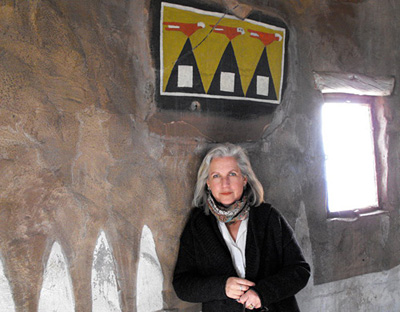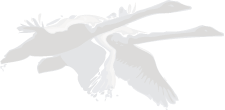
Photo: © Louis Gakumba

A BOW TO THE CARIBOU
by Terry Tempest Williams"...all natural objects make a kindred impression, when the mind is open to their influence."
-- Ralph Waldo Emerson
Two young men, guides, lead a group up the Toklat River in Denali National Park in the interior of Alaska. It is midsummer, there is no rest from the light. They walk up the braided river that looks more like quicksilver than water. The gravel bed of rounded stones tells a story of movement and metamorphosis originating in the glaciers that continue to shape the Alaska Range.
Tracks of wolves are seen. A woman walking with her daughter bends down and places her hand inside the imprint. Other individuals gather and stop. They lift their binoculars and scan the valley for animals. No wolves, but half a dozen dall sheep are spotted, perched precariously on the steep slopes rising from the river. From afar, they appear as a white outcropping of stone, so still is their countenance.
Up ahead, a grizzly has overturned the tundra in search of roots. A golden eagle is harassed by a harrier. For hours, the group led by the two men watches and witnesses the subarctic in motion.
The tapestry of tundra bordering the braided river is deceiving. It is not solid ground, but wavers with each step. Dwarf birch, willows, alders, kinnick-kinnick, cottongrass, bear flower, blueberries, cranberries, lousewort, lupine, avens, and arnica create a subarctic garden that draws one down on hands and knees. One of the guides rolls up his shirt sleeve and with his hand bores through the layers of vegetation until he hits a cold layer that stops further exploration. Permafrost. Others feel for the ice and find it. Juncos flash tail feathers and the group continues walking.
The group sits on a bank carved by the Toklat and eats lunch. The two guides rise. The group does not understand. They watch. Across the river, a small herd of caribou are seen. They are watching the human beings watching them. The young men who walk this path frequently slowly raise their arms high above their heads and then softly bend their elbows in a graceful pose like dancers. But they are not dancers, at this moment they are caribou, their arms resting above their heads as antlers. The guides face the caribou and bow.
The group begins to laugh. They cannot believe what they have just seen. They think it funny, until they realize, the bow is a small gesture in big country before the animals who live here, who have wandered these gravel beds of the Toklat River for generations.
The caribou continue to stare and then go on their way.
We cannot forget wild Alaska. We cannot forget the clicking hooves of caribou as they traverse the tundra creating their long, meandering paths of migrations. We cannot forget how these northern lands have shaped our imaginations, inspired us to stand our ground in the places we call home. John Haines writes, "Alaska....having once known we can never put out of mind."
We cannot afford to take anything for granted in the name of wildness. Surely there is a line that cannot be crossed and that line is drilling for oil in the Arctic National Wildlife Refuge. Conservation is a generational stance where vows to preserve an ecological integrity in the interest of community must be renewed over and over again.
Do we have it in us to rise up against the current political winds that say unabashedly, "the only thing we are interested in conserving is this blessed American way of life."
The Bush Administration is both arrogant and ignorant. Arrogant enough to say they can and will drill for oil in the Arctic National Wildlife Refuge without any adverse impact to the land, and ignorant enough to believe it.
We must demonstrate now to President Bush and Vice President Cheney that the energy crisis they are committed to exploiting will not result in compromising the Arctic or the Interior West or any other areas of fragile, wild beauty. Public lands are our public commons.
We have within us our own natural resources, a renewable energy for the wild fueled by the power of our hearts. There is no crisis here. We can gather together and stand, a million or more, as witnesses for the wild. We can raise our arms high above our heads, gently curve our elbows and bow, bow to the caribou, in the name of love.
This article published by The Wilderness Society, in Wilderness Magazine, October, 2001. Used by permission of The Wilderness Society.
